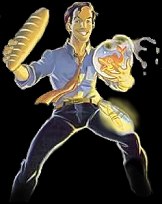
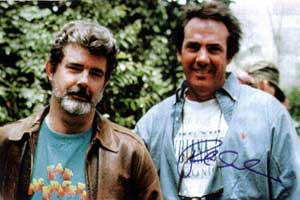
 |
 |
Play Zak LEGALLY! And super cheap!
Watch the demo (or this bigger one) (You'll need the Scumm virtual machine)
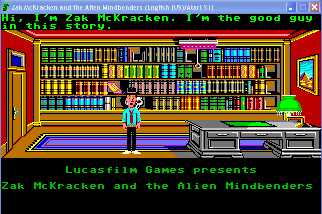
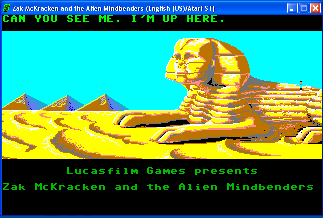
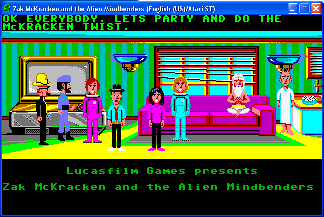
Open the box...
If you were lucky enough to grab a copy of Zak when it first appeared in 1988, you would have seen something like this: this is the front of the Commodore 64 box. Click on the image to see a super giant size box scan (suitable for wallpaper... real bedroom wallpaper!)
The box art, without the writing.
Click here for a giant version, with the
Zak logo but no other text.
And I do mean GIANT, like poster or real wallpaper size
The back of the box (different boxes have different screen shots)...

Here are the goodies from inside the box. The security codes were originally printed on red paper to make photocopying almost impossible (back in 1988 anyway). Here are the German edition and the English language edition.

Image kindly provided by 'susiboy' of South Korea. Click the pic
to read the newspaper
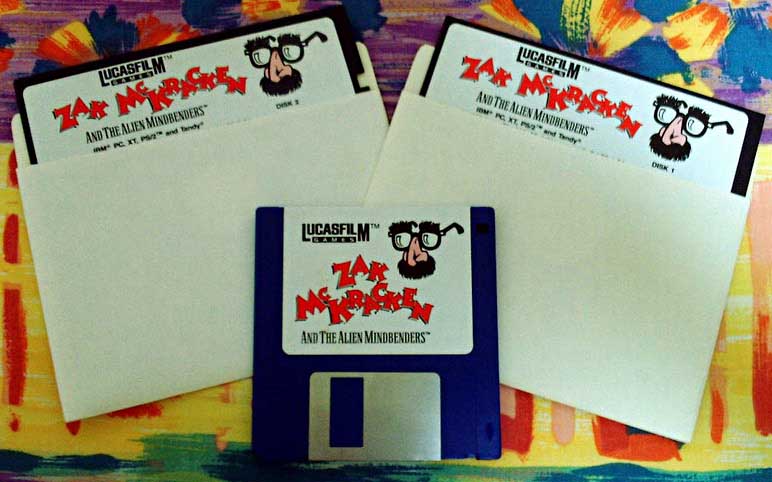
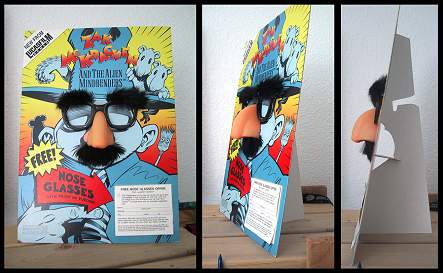 If you were among the first to buy the
game, you could send in your receipt get your own free
nose glasses! This is a picture of the display stand
from the games shop: If you were among the first to buy the
game, you could send in your receipt get your own free
nose glasses! This is a picture of the display stand
from the games shop: |
 And if you were among the first to
COMPLETE the game, you won a T-shirt! One lucky player
(we shall call him 'Mark') remembers fondly: "I
bought Zak at the stores way back when and was one of
the first to solve it! :) I was rewarded with a
T-shirt from Lucasfilm games. :)" And if you were among the first to
COMPLETE the game, you won a T-shirt! One lucky player
(we shall call him 'Mark') remembers fondly: "I
bought Zak at the stores way back when and was one of
the first to solve it! :) I was rewarded with a
T-shirt from Lucasfilm games. :)"
|
To continue the authentic Zak McKracken experience, read the user guide...
Images from Moby Games the LucasArts museum, and elsewhere
The story: short version
Zak is an ordinary guy living in San Francisco. His job is reporter for the 'National Inquisitor.' Then one night he has a dream. Someone is trying to warn him of something. Space Aliens have built a stupidity machine that's slowly reducing everyone's IQ to single digits. They've taken over the phone company, and the only person who might believe him is Annie Larris, Head of the Society of Ancient Wisdom...
Well, that's how it starts. Click here to find out more!
Why Zak is
probably the greatest game of all time
It's
a lot of fun. So many games fail on this! But sure,
plenty of games are fun, so what makes Zak better?
It's
inspiring. Look at the message: ordinary guy, like you
and me, saves the world from stupidity. And discovers the most
amazing stuff along the way. What could possibly be better than
that?
It's
a technical masterpiece. Explore the entire world, and
outer space, all in one low density floppy disk (in the original
version). That's right, the whole thing uses less space than a
single picture in a modern game. And it ran on a 985 kHz processor
with 64K RAM (the PAL Commodore 64) : literally thousands of time
smaller (and hence faster) than a typical modern game, yet it
covers bigger topics.
It's
a design masterpiece. The game is bursting with color and
ideas: every location is real and iconic, almost every image is
iconic: the nose glasses, the two headed squirrel, the hats with
holes... unforgettable. But the real design genius is the hidden
message: the game is propaganda for all that is good and positive,
yet wrapped in anarchic humor! Look carefully: there's no killing,
there are no truly evil guys (they're just stupid), there's very
little stealing (except when absolutely necessary to save the
world, and when nobody was using the object at the time), and no
sexism: most of the main characters are female, yet not as sex
objects. You see things from other points of view (switching minds
with people and even animals). It's all about learning and
inspiring and making the world a better place, yet the message is
completely hidden under the radar! Nobody (except me!) calls this
an "educational" game: it just feels like absurd crazy fun. That's
an incredibly hard trick to pull off! Has any other game ever
succeeded?
The origin of Zak
For details, read Droidmaker, or any of the interviews with David Fox.
The Lucasfilm games division was originally not supposed to just be games, and existing games makers were deliberately not hired. The first employee was Peter Langston, hired to be head of the 'games group.' Peter then grabbed Rob Poorr from the film writing project he was on, then David Fox was the first outsider hired. Fox was a counselor, idealist and visionary who had only made one game before (for the educational Childrens' Television Workshop). George Lucas was interested in educational ideas and just seeing what the technology could do. The direction turned to games mainly because of commercial pressures. When David Fox created Zak, he wanted it to be more than just a game.
This ethos is reflected in the other very early LucasArts games, such as Ballblazer (a way to use real physics and get a real two player game instead of player against machine) and Rescue on Fractalus (a way to squeeze beautiful fractal technology onto the extremely limited personal computers of the time'and also a non-violent game in the original design.) The early LucasArts games were pushing the boundaries of ideas and interactions.
The original plan for Zak was to be fun, but not as crazy as the final game turned out. The craziness was increased after a brainstorming session with a group including Ron Gilbert, the genius behind Maniac Mansion (the game before Zak) and Monkey Island (the game that came after). Ron is an industry god, he has a keen eye for what's funny, and he probably helped sell a lot more copies of Zak. But the extra craziness means you have to look a little harder to see the deeper, mind-expanding side of Zak.
"I don't think I was ever aiming to make Zak a serious game... Just more serious than it turned out to be. Ron wanted it to be much more wacky, and that's the direction we took it in after that brainstorming session. Funny, most of the ideas were in place before that session, including the Shaman, Guru, maybe even the two-headed squirrel... I think he may originally have worked for a mainstream newspaper instead of a trashy one... But the original goal to throw in every New Age element we could think of was there from the start..."'David Fox
Zak was possibly the first and last game to successfully combine fun with mind expanding ideas. Sure, there have been worthy educational games since then, but none of them have really caught people's imagination. Zak succeeded on so many levels. But since then games have become, well, just games. Nothing more. Some very good games, but purely for fun. I subscribe to a monthly games magazine now and every month I search in vain for something different, something that goes beyond just a game. And every month I get the same genres. Occasionally there are genuinely new ideas (such as Katamari or the Nintendo DS system) but they are just novel ways to have empty fun. The idea of "not just a game" seems to have been lost somewhere along the way.
George Lucas in his Zak McKracken T-Shirt.
Based on many sources. For more about the early days of LucasArts, see the 'History of Lucasfilm Games and All That' by 'Chip' at Habitat (the site for former LucasArts employees)
50,000 BC: In the story, the Skolarians depart from Earth, leaving behind components for 'the device'. 1650s: The Monkey Island games are set in the 1650s.
1938+ The Indiana Jones games are set just before and after WWII
1947: The first modern UFO sighting, by pilot Kenneth Arnold, June 24th, 1947 near Seattle. In Zak, the Caponians take an interest in earth. 1965: Meteor lands on Maniac Mansion (note references to Maniac Mansion in Zak: the oil can, razor's music, telephone message, wall posters). Maniac Mansion itself takes place circa 1986, and Day of the Tentacle circa 1990. 1975: The world's first and most influential computer adventure game. (OK, Star Trek and Wumpus were even earlier, but you couldn't really call them adventures.) Will Crowther was a programmer at the legendary Bolt, Beranek & Newman (developers of ARPANET, the forerunner of the Internet). He enjoyed caving, and begins creating 'Colossal Cave Adventure' to run on the company mainframe. 1976: The original Star Wars opens. George Lucas begins to become a very wealthy man. Don Woods expands, finishes and releases 'Colossal Cave Adventure' (also known as just 'Adventure') 1977: David and Annie Fox open Marin Computer Center, the world's first public access microcomputer center. The first home computer'the Atari 2600. Mainly good for Pong and Pacman, not powerful enough for much else. Atari at first makes money, but runs into financial difficulties. it is bought by Warner Brothers and they start talking games. Movie studios doing video games? Now there's an idea! 1978: Scott Adams plays 'Colossal Cave Adventure' and writes his first adventure game, 'Adventureland' for the Radio Shack TRS-80 computer. Adams is often credited with inventing the adventure game industry. For example, he was the first to put them onto home computers. Atari (still part of Warner) get new management and become far more businesslike'previously it was a bunch of crazy drunk creative geeks. 1979: Space Invaders reaches America (in arcades). Suddenly everyone is talking computer games! Atari releases Asteroids, which eclipses Space Invaders. Next year, Atari get the license to market Space Invaders on home consoles, and they make more money than ever. 1980: Roberta and Ken Williams play 'Colossal Cave Adventure' and are inspired to create 'Mystery House' for the Apple II computer: their company, Sierra, goes on to create numerous adventure games, most notably the Kings Quest series. Atari release Battlezone for arcades, the first 3D game. Atari is making a ton of money for Warner Brothers, and other movie makers are noticing. Atari was given a huge research project and had dozens of secret projects. George Lucas will soon do the same.. 1981: Apple's, Atari's, and TRS-80's become popular'the mass market home computer had arrived! Floppy disks replace tape drives. More complex games become possible. Pac Man is released. The U.S. home console market doubles in size to two billion dollars. But the Atari version of Pac Man is disappointing and their success is leading to complacency. Meanwhile, Lucasfilm, now creating Return of the Jedi, is pioneering special effects with computers. The Atari bosses want to make games using this kind of technology. 1982: George Lucas is busy making money from Star Wars and thinks games may be a distraction. But Atari lobbies hard, so Lucas agrees to make games with Atari as long as Atari provides the money. Atari makes a Raiders of the Lost Ark game. Other movie companies hear of the money to be made from mixing games and movies, and do the same kind of thing. At this point, Parker brothers have the rights to sell Star Wars games, and Kenner have the rights to Star Wars toys. There is some discussion over whether a home console is a game or a toy. Finally Atari get the rights to do Star Wars arcade games (based on Battlezone but now in color) and Parker did the home console versions. These games are made under license by outside companies. The Atari people (still working with Lucas) think it makes more sense to use Lucasfilm's computer division to make their own games. Lucas agrees to start making new games and educational tools, but still let outside companies do the Star Wars games (they are seen as easy money). Peter Langston is hired to run the new division. Langston is a Unix geek used by various Wall Street legal firms. He played in a band and made the classic text-based computer game "Empire." Langston doesn't want to leave New York (he had a good life there) so Lucasfilm (based in Marin county, California) agrees to fly him back to New York for two weeks each month.
David Fox explains how he got hired:
"While working on our Computer Animation Book in 1981, I got to spend time with some of the Computer Division people, including Loren Carpenter. Alvy Ray Smith, one of the founders of the division, agreed to give our book a technical read through. And Lucasfilm agreed to let us reprint some of their computer imagery from Star Trek II and other projects. When I heard about the pending Games Group from Gary Leo, I contacted the head of the Computer Division, Ed Catmul, who told me they had just hired Peter, and that when he was next in town, he'd put him in touch with me."
Note that Lucas wanted the games division to also do educational stuff. DF is/was a counselor, and liked that side of the idea. The one game he had already programmed was for the Children's Television Workshop, whose Sesame Street combines fun and education. Jumping forward a few years, this is the aspect of Zak McKracken that I love most, and it's the side that is usually forgotten. Although Ron Gilbert (wisely) cranked up the fun aspect, the original idea was for Zak to be more serious and mind-expanding. Hence the many locations and esoteric themes. The same philosophy was to be seen in the earlier Fractalus game. The game had no guns and you defeated the aliens with your skill at flying. But George Lucas insisted on guns. No doubt it made Fractalus more popular, and business is business, but I prefer DP's less violent approach.
David Levine becomes the next employee. He was a Unix engineer looking for something more interesting. Langston avoids hiring existing games people because he wants new ideas. He really wants to hire serious programmers, but many of them think games are too frivolous. My favorite quote from Droidmaker by Michael Rubin (from page 304):
"It took time for Langston to be able to describe the projects "so it sounded" as he put it, like "a legitimate enterprise." The people who were ready to sign on were already a little rebellious. Neither David Fox nor Dave Levine cared much about legitimacy'Fox, the idealist, because he had such a positive attitude about everything; and Levine, the iconoclast, because he couldn't care less about what others thought."
This year also sees the Commodore 64, Electronic Arts, Zork 1, and Microsoft's first game ( 'Olympic Decathlon''but it didn't sell well, so Microsoft avoids games for many years.)
1983: Levine is keen to create a real two person game involving real physics, which later becomes Ballblazer. The team also works on Loren Carpenter's fractals, for a game initially called Rebel Rescue, which later becomes Escape from Fractalus. The initial plan was to make games for the old VCS console, but the soon to be released new Atari seemed like a much more attractive idea. The computer division spends about half a million dollars developing an amazing demo film. However, Lucas is concerned that this is a lot of money to spend when there is no profit in sight. So he plans to break up the computer division.
1984: The computer division is broken into three parts:
- Pixar: This is later sold to Steve Jobs and makes lots and lots of money.
- Droidworks: This business created digital editing systems. It was ten years ahead of its time, which meant the hardware was very expensive. It only sold a few systems, so it lost money, and was eventually closed.
- Lucasfilm Games: This only had eight people, and thanks to a contract with Atari, it was not losing money. And it was the only division to actually create salable, movie-like products. So it survived.
Lucasfilm games releases its first games: 'Ballblazer,' and 'Rescue on Fractalus.' DF is designer/project leader on 'Rescue,' which became famous for using fractal terrains, and for a genuinely scary monster sequence (initially suggested by George Lucas himself).
1985: The rise of the Amiga and the IBM PC'which system will rule the world? 1986: Labyrinth: Lucasfilm Games' first adventure game. The first mainstream game to use point-and-click instead of typing in words. Maniac Mansion is set in this year.
1987: Maniac Mansion, the world's first SCUMM game (Script Creation Utility for Maniac Mansion). Ron Gilbert created the engine, and DF was the chief scripter. SCUMM games were notable for avoided the Sierra habit of killing the player without much warning. 1988: The home computer market moves from 4 colors to 16 colors. Zak McKracken and the Alien Mindbenders is released. DF is Designer/Project leader, and SCUMM scripter. Matthew Kane was co-designer, scripter, and audio designer. Zak was translated into German, French, Italian and Spanish. Runs on the Commodore 64 (16 colors, low resolution), PC (16 colors, higher resolution), Apple II, Amiga and Atari ST. DF remembers the Amiga and Atari as using 256 colors, though I have not heard this from people who played the game. (Another mystery? :) ) 1989: The home computer market moves from 16 colors to 256 colors, and the Adlib and Soundblaster sound cards are introduced. The Japanese translation of Zak is made in 256 colors (with CD music) for the FM Towns console, available in February 1989. This is one of the first games ever to ship on a CD-ROM. (The game 'Manhole' beat it by a few weeks.) But most games are still on floppy disk. David Fox is heavily involved in the third classic SCUMM game, Indiana Jones and the Last Crusade. 1990: Lucasfilm Games is renamed LucasArts. Or to be more precise, the Lucasfilm Games joins other Lucas companies (Industrial Light & Magic, Skywalker Group, THX Group, LucasArts Attractions, LucasArts Luminaire, Lucasfilm Learning Systems, and Lucasfilm Commercial Productions ) as LucasArts Entertainment Company. Classic SCUMM games: Loom and Escape from Monkey Island. David Fox moves away from adventure games, to make a Star Wars flight simulator game for theme parks. But the technology is too expensive for the time, so the project is shelved. David Fox: "The last year at LucasArts I was the Director of Operations. That was to help transition the division from a small group into something more organized, hiring people to head tech support, customer support, the art department, music department, etc. Important, but my least fun year there. " 1991: LucasArts makes its first Star Wars game (previously it had a policy of licensing the Star Wars games for others to make). Classic SCUMM game: Monkey Island 2: Le Chuck's Revenge. 1992: David Fox leaves LucasArts to start Electric Eggplant. (After a year of freelancing he joins Rocket Science Games in 1993. In 1996 he leaves games altogether.) Classic SCUMM game for 1992: Indiana Jones and the Fate of Atlantis. 1993: LucasArts Entertainment Company is reorganized again: the games people become part of LucasArts Entertainment Company. The movie effects people (ILM and Skywalker Sound) become Lucas Digital. Classic SCUMM games: Maniac Mansion II: Day of the Tentacle (still highly influential) and Sam & Max Hit the Road. Elsewhere, Broderbund releases Myst, and id software releases Doom. 2D adventures have a serious challenge. 1994: Sony releases the Playstation in Japan. Fast moving, graphics intensive games begin to dominate. 1995: Classic SCUMM games: Full Throttle; The Dig. However, a number of events signal that flashy graphics are taking over the games market. The CD-ROM becomes the main medium for games; Windows 95 is launched; the Playstation comes to the US, and the Nintendo64 is launched in Japan. In 1995, Aaron Giles joins LucasArts and ports SCUMM games to the Macintosh. He also creates an updated SCUMM player for Windows. But he doesn't like the big business, 3D direction of modern games, so leaves in 1998. 1996: Nemo Pohle begins the Zak 2 Project. 1997: The year when Zak McKracken 1 takes place. To be specific, it starts a few weeks before June 24th, 1997 (Zak starts by preparing for the 50th anniversary of the first modern UFO sighting.) SCUMM game: The Curse of Monkey Island 1998: SCUMM game: Grim Fandango (first 3D SCUMM game) 1999: SCUMM game: Indiana Jones and the Infernal Machine 2000: SCUMM game: Escape from Monkey Island 2001: Zak 2 hits problems. Is later reborn with a new team, as 'Zak McKracken and the Alien Rockstars' (still not complete).
Another fan sequel, 'Zak McKracken'between time and space' is announced2002: A busy year for Zak...
ScummVM (SCUMM Virtual Machine) is launched, enabling Zak and other SCUMM games to run on various modern platforms.
First fan sequel complete. Thanks, LucasFans!
The Zak256 project is complete: an unauthorized conversion of Japanese 256 color version into English (and German), playable via ScummVM. Meanwhile, critics are saying that LucasArts relies too much on its Star Wars franchise, and they say the later games come out too often and quality suffers. LucasArts announces that fifty percent of its titles will be non-Star Wars. However, the non-Star Wars games don't sell as well, so the fifty percent plan soon died.2003: (?) Zak 'between time and space' gets a major revamp, looks ten times better, and more likely to be completed. Meanwhile, LucasArts cancels its sequel to Full Throttle. 2004: The end of an era. LucasArts cancels Sam 'n Max 2, signaling the end of adventure games for the company, and the end of adventure games for any major games company in the USA. However, in the best traditions of ancient wisdom and lost empires, adventure games are kept alive by an underground of true believers in far off lands (i.e. Europe). The dark ages cannot last forever. :) 2005: 'Skolarian Bosses' announces work on another fan-made Zak sequel: 'Zak McKracken in the Mushroom Kingdom''. And classic adventure games are back from the dead -Telltale games gain the rights to Sam and Max, and plan to release the first new game in 2006. 2006: Zak McKracken 2: Between Time and Space is scheduled for release. Again. :) Zak fans learn to be patient. Tell Tale Games begin releasing new Sam 'n Max episodis games. 2007: Zak McKracken and the Lonely Sea Monster is announced, with a working demo. It was scheduled for release in July, but was rescheduled for Summer 2008. Also, the original fan project hits another delay. 2008: April 19th: Zak McKracken 2: Between Time and Space is released! And a few weeks after, the original fan project announces that it's closed down. Zlorfick! 2009: Tell-Tale games release Tales of Monkey Island.
2010-11: LucasArts keeps changing management. "An outside observer might look at the revolving door of presidents'three in the four-year period between 2008 and 2012'and wonder how anything got done. Instability ruled the realm; every high-level turnover came with layoffs and cancellations and a total shift in company direction led by whoever would take over next." Source. The amost finished Star Wars 1313, wowed fans. Creative director Dominic Robilliard noted "I lost count of how many publications and interviewers at E3 said that Star Wars 1313 was literally the 'best thing they had ever seen'. I've never worked on anything that has drawn that level of praise. [And the demo] was real. Real gameplay, real (time) visuals and from a genuine part of our game." Source. 2012: Disney buys LucasFilm, the parent company of LucasArts. On the same day Disney CEO Bob Iger said in a conference call that his company would be 'likely to focus more on social and mobile than [they would] on console" [console = the LucasArts games] Star Wars 1313 is canceled. Source.
Demand for 2D adventures is still high: "In February 2012, Double Fine along with 2 Player Productions, announced a Kickstarter project (codenamed Double Fine Adventure) aimed to create a new 2D adventure game featuring art by Double Fine's in-house artist Nathan Stapley. The kickstarter effort was started because the adventure genre has been perceived as niche and commercially risky. The project aimed to collect $300,000 for the game's development and $100,000 for the filming of the game's development by 2 Player to be released alongside the game. The project reached its $400,000 funding goal in under nine hours of the month-long drive. Within 24 hours, Double Fine Adventure had raised more than a million dollars, becoming the most funded and most backed project ever on Kickstarter until it was surpassed by the Pebble E-Ink Watch in April 2012. The game is being developed with the Lua-based Moai platform, and is scheduled for release in Q2/Q3 2013." - Wikipedia
2013:
LucasArts closes down on April 3, 2013, "and laid off its staff. Development of video games based upon Lucasfilm properties (such as Star Wars) will now be assumed by Disney Interactive Studios or licensed to third-parties"'Wikipedia
2014:
You can't keep a good adventure game down! A new Zak fan game is announced: Zak McKracken Goes Looking for Hot Coffee, by one of the guys behind Between Time and Space.
Also, Thimbleweed Park is announced: it's from the masters of the craft: Ron Gilbert and Gary Winnick. Best of all, David Fox said on Facebook that he's been asked to help! This isn't Zak, but it should be the closest thing to Zak we've seen since 1988.
Also, you can play Zak online at the Internet archive, but as a true fan you of course want to buy a legal copy from Grand Old Games: it's super cheap, so what are you waiting for?
And finally, I'm back working on my own Zak tribute; TEDAGAME. I've been working on this idea since 1997: an adventure game where you can go anywhere and do anything. I mean literally anywhere and anything: any part of the universe, any scale, any time, any story you can imagine. (And if it doesn't have what you want you can add it, wiki-style). It's designed to be mind expanding, as that's what I got from Zak. it's not about stealing or fighting, it's about opening the mind to new ideas. Visit Facebook for a brief history of the game. This is a very long term project. To help me along I'm taking a six year part time degree to improve my coding skills. I hope to use the game as my final thesis, but I haven't discussed it with my tutors yet so we shall see. But 2021 is the most likely release date. And yes, it will involve two headed squirrels. :)
2015:
Finally! Zak is available legally for the first time in decades! Grand Old Games has made us all happy, and it's ridiculously cheap. Buy two copies! Buy copies for your friends!
Plus, a live action short fan movie! Zak is alive and well.
2018:
Sorry for the lack of updates. This isn't because of lack of news, I've just been really busy making my own game. Here are a few of this year's highlights:
For the very latest Zak news, DuckDuckGo is your friend. Or simply follow Zak Phoenix McKracken!
- The 30th anniversary celebration!
- New fan film!
- Two new Zak mini-games!
- Zak's bedroom - in real life! (Scroll down)
2019:
New fan game! Eight years in the making! Zak McKracken Goes Looking For Hot Coffee - in All The Wrong Places, a sequel to Zak, and prequel to Zak McKracken Between Time and Space!
Zak Repixeled! The first part of Zak, rebuilt from scratch by Tino Bensing, using Adventure Game Studio! More details here: https://gamejolt.com/games/zak-repixeled/457361 and here: https://www.adventuregamestudio.co.uk/site/games/game/2394/2020:
Daniele Spadoni is doing amazing things, creating new Zak fan games - and much more! The Pixel Has You; A Mansion A Meteor and Alien Mindbenders; see his latest games here!
"Interestingly, I think Zak was far more popular in Germany and Europe than in the States. I'm not sure why... maybe my humor was more European in nature??" - David Fox
Three of the four main Zak McKracken fan sequels are based in Germany. The game was made in America, based in America, and visits many parts of the world but never Germany. Yet Germany is the center of the Zak McKracken world. Why? This is the biggest riddle of all. Or perhaps not. Here is what David Mueller wrote:
The legacy of the Commodore 64
I think there are several reasons why the most enthusiastic Zak-Fans live in Germany.
- First, Zak was released for the C64 in 1988 (correct me, if I'm wrong), and the C64 was very common in Germany, more than anywhere else (perhaps Scandinavia).
- Second, it was among the first games translated to German. And the translation was done by Boris Schneider, one of the most important persons in the Computer-Games-Magazines-Business in the late 80s (founder of Magazines like PowerPlay, so Zak got very much publicity here in Germany.
- And third (and most important), Zak is a great game! And we Germans know when we see good quality ;). It was far ahead of its time, being somewhat non-linear, with zany humor, and a huge area to explore.
The people I knew these days that also liked Zak that much were all big fans of The Hitchhikers Guide to the Galaxy (that went very popular in Germany in the late 80s, too). I still remember that a friend of mine compared Zak to Arthur Dent, and if I think of it, they have a lot in common. Both of them unsuspectingly get involved into a very, very big adventure, actually much too big for them . It's like all of us would react if _we_ were the ones participating in that adventure: Being totally lost. It's not the common scheme: You're not the big, chosen hero, to fight the arch-villain, to save the world, to get the princess in the end.
We'd all like to be Indiana Jones, Luke Skywalker or Gandalf, but in fact, we are Arthur Dent or Zak McKracken. That's what makes Zak so special. Just look at what other main characters of Computer-Games became popular (and, that's important, _stayed_ popular): Bernard (the only one not happy to save Sandy in Maniac Mansion'and the only one to appear in the sequel!), Zak McKracken, Guybrush Threepwood, Manuel Calavera, Roger Wilco and Larry Laffer. Not the prototypes of heroes...
And Zak was (besides Bernard, who was not the real main character) the first person in a computer game that one could identify with. Maybe in Europe we like the Anti-Heroes more than the Heroes...
I don't really know about that and how the market was structured in the US and in Germany, but Adventure-Games always have been (and still are, I think) more successful in Germany than in other countries. That's also the reason (I think) why the classic Point'n'Click Adventure games are dying. Germany is a far to small market for a major Company to rely on ("The longest Journey" by FunCom, a Norwegian company sold very, very well in Germany, more than everywhere else, but still they don't really want to produce a sequel... "Too risky" is what they say).
And LucasArts, well, what they are doing to the Adventure-Genre I really don't want to comment. Canceled Sam'n'Max 2, canceled Full Throttle 2, and Monkey 4... well...
The legacy of the Amiga
On 'adventuregamers' (link now dead), 'dacloo' had this to say. (I asked him for permission to copy this, but he never read the message - he's not a regular there. But I don't think he'll mind me posting this):
Regarding the US & Europe development/target audience debate, I have to say that it has to do a lot with gaming culture as well.
I don't think much people will agree what I say in this paragraph :
In Europe Germany is by far the largest adventure game market around. In the mid eighties, Germany, the UK and the Netherlands (+ others) used to have a strong Amiga computer base. Everyone had a copy of Monkey 1 and other adventures around (illegal copy unfortunately he-he). But, although those games ran on the PC platform as well, I remember that the PC market, mainly US, was soon flooded by Wolfenstein; the big-bang for 3D games. On the Amiga, 3d games didn't get popular since it was not a machine build for 3D speed. I won't say the Amiga is responsible for the culture'it's just a small factor. I'm just making a point that the culture plays a big role here.Much more noticeable however, is the Hollywood approach in the US, where games most of the time are very "Hollywoodish". Heroes, violent wars, genetic manipulated monsters....Even if it's a whole continent, the culture there is more based around violent FPS games (no offense) and that doesn't make it an attractive market for European adventure developers, unless you make an "action adventure". This is what I concluded by talking to US and European publishers.
A question of culture
Here is my own view on the culture theory. (I am sure the C64 and Amiga theories are also correct, but they are history now. The culture theory is just as true now as in the past. Perhaps more true, given recent political events.)
Today's most popular games fall into two broad categories. I will call them 'action' games and 'control' games. Action games are the fighting and shooting and racing variety. Lots of adrenalin, very popular with teenage boys, the (current) big market for games. The other popular games are all about control. You control armies or empires ('God games'), or you control individuals and families (the Sims). Put bluntly, all the popular games are about one thing: power.
But Zak McKracken is different. Zak is unique. There is no shooting. You don't even microwave a hamster - just an egg! Even the bad guys have a story. In Maniac Mansion the bad guys are twisted, a little deviant. But in Zak they are just a product of their culture, and not even very bright! The real enemy is stupidity. The game is not about power and control. You don't even have much power over Zak himself: he has a job that he doesn't like, and he takes the entire game just to persuade Annie to like him. The game of Zak McKracken is not about power, it's about discovery: you discover the world, other worlds, the past, science, culture, you expand your mind. Sure, it's fun, and crazy, but it is more than that.
David Fox has often said that he wanted to do things that make a difference. Maybe it hasn't changed the world, but Zak is different. Zak is probably the purest example you will find of the adventure game. Sure, Myst is more challenging, and Loom is more spiritual, but Zak is about an ordinary person, like you and me, and it explores further and wider than any other game I know. Adventure games are all about exploration. You put in a lot of legwork, and even more brain work, for relatively small results. The satisfaction is not measured in numbers, but in discovery, and in learning and in making a lasting difference.
Power games are so popular in America that they have pushed adventure games out. Is it simplistic for me, a European, to see this as a reflection of cultural differences? Differences that are also reflected in politics? America is a powerful nation. Americans like power. Powerful cars. Powerful leaders. They prefer active solutions to the endless talking of Europeans. Europeans like power as well, but they also like to explore and to think. Europeans still have a place for Zak McKracken.
I do not know, but I think that Zak has lasted longer than other games because it goes a little deeper. Sure, it's fun. Sure, it's anarchic and silly. But it is more than that.
Edited highlights from a recent thread on Adventuregamers:
According to a recent interview "The world's hottest adventure market is Germany". From bad-brain to various other developers, the adventure genre is flourishing in Germany.
But the German market is not magical'developers have to work hard, like anywhere else
Two years ago, the adventure was dead in Germany. ... So someone had to find a really good adventure, take it, and see how it would sell. We did this with Runaway, which was a huge success in Germany. With this title, we just kicked things off. Now, adventures are coming back to a form of their old glory.
The difference may simply be good marketing
[An interview with a German developer showed the care they took in choosing a well-known product and aiming at older buyers. Other writers noted the care that is taken in working with fans.]
More PCs, fewer consoles in Germany
The Jan 29-Feb 4 issue of The Economist has an article about video gaming in Germany. A graph shows that while 44% of American households have a gaming console, only some 13% of German households do.
And then there's the culture again
I'm German myself. ... I heard or read somewhere that a lot of games created by Germans are considered much to complicated in North America. Maybe the Germans like to be challenged by the games, while in other countries people play to have fun. ... Germany has a very strong gaming market period, Board games for example are huge in Germany, maybe its just that German people are serious when it comes to gaming.
Or maybe Germans are just less attracted to the American mix of sex and violence
German parents are stricter about what entertainment they allow for their kids than parents in other countries. ... A rule of thumb I've often heard is that sex is taboo in the US, while violence is taboo in Germany.
Or maybe the Germany difference is an illusion
I think that adventure games are more popular in Europe in general and Germany is one of the bigger countries here. It's as simple as that really.
home